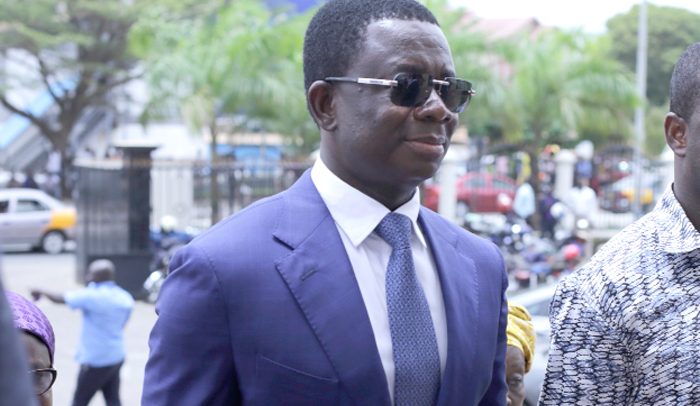Dr. Stephen Opuni
AN ACCRA High Court has adjourned to December 1, 2022, a motion filed by former Chief Executive Officer of Ghana Cocoa Board (COCOBOD), Dr. Stephen Opuni, asking it to set aside its order dismissing an application which sought to restrain Justice Clemence Honyenuga (rtd) from continuing to preside over the case in which he has been charged for causing over GH¢217 million financial loss to the state.
This was after the court ordered counsels for Dr. Opuni as well as his co-accused, Seidu Agongo, to file their written submissions on the affidavit in support of the motion.
The prosecution is also to file its written submission on its affidavit in opposition to the motion. Both counsels for Dr. Opuni and the prosecution are to file their written submissions simultaneously by November 28, 2022.
Justice Honyenuga gave the order after it turned out that counsel for Seidu Agongo affidavit in support was served on the prosecution in court yesterday while the prosecution’s affidavit in opposition was also served on the lawyer in court.
The application is also seeking a stay of proceedings and a referral of Articles 139(1c) and 145(4) to the Supreme Court after the court held that the Chief Justice acted within the constitution when he extended the tenure of the retiring judge.
The trial court had dismissed an application filed by his lawyer seeking to restrain the judge from further hearing the case on ground that he has retired after attaining 70 years, which is the statutory retiring age for Supreme Court judges.
The Chief Justice, in accordance with Article 139(1c) of the Constitution, gave the judge six months pursuant to Article 145 of the Constitution to conclude the trial.
But Dr. Opuni through his counsel filed an application challenging the extension, and his lawyer, Samuel Codjoe, moving the application yesterday argued that the appointment of a High Court judge under Article 144 is totally different from that of the appointment of an additional High Court judge under Article 139(1c).
“We are submitting that the Chief Justice engaged in an unconstitutional act when he purported to extend the tenure of your Lordship under 144(11),” Mr. Codjoe argued.
“Although the CJ is the administrative head of the judiciary, he cannot grant an extension to the tenure of a judge who has attained the mandatory constitutional retirement age,” Mr. Codjoe added.
The application was opposed by the Director of Public Prosecutions, Yvonne Atakora Obuobisa, who argued that the Chief Justice has power under the 1992 Constitution to grant power to a Justice of the Superior Court to sit for a limited period of time.
She referred to Article 145(1) (2a) and (4) of the Constitution, and argued that from Article 145(2a) and 4(a), a Justice of the Supreme Court who attains the age of 70 may continue in office for a period not exceeding six months after attaining that age, to enable that judge do any other thing in relation to proceedings which were commenced before attaining that age.
“If the drafters of the Constitution intended for the President to give an extension, they would have stated so. It is not there because Article 139 has already provided for the one to give this extension for a limited period of time.
Justice Honyenuga (rtd) dismissed the application on ground that the Chief Justice is the administrative head of the Judiciary and has the power under the Constitution to grant an extension to a retiring judge.
BY Gibril Abdul Razak

